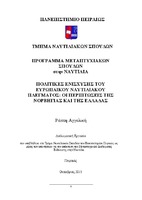Πολιτικές ενίσχυσης του ευρωπαϊκού ναυτιλιακού πλέγματος : οι περιπτώσεις της Νορβηγίας και της Ελλάδας

View/
Subject
ΝαυτιλίαAbstract
Fierce competition had always been maritime industry’s main characteristic. In fact, this is what allows it to evolve dynamically. On this basis, the creation of maritime clusters was considered as an effective way of dealing with this demanding situation. Some of their vital features, such as the agglomeration, seemed to encourage innovative activity, and consequently competitiveness, straight from the beginning, strengthening the whole cluster and demonstrating a positive influence on the region or the country, in which they belonged. It was imperative that policies and regulatory frameworks be established, in European and national level, after the industry’s trend towards clustering. This kind of policies ultimately aims to the protection of all maritime sectors and all European Union’s operations, through regulations that promote the industry’s safe development and, simultaneously, protect the environment. The contribution of maritime clusters to the national economies, and therefore to the European, is undisputable and it is clearly reflected in the Norwegian and Greek maritime clusters’ case studies, which are discussed in this paper.


